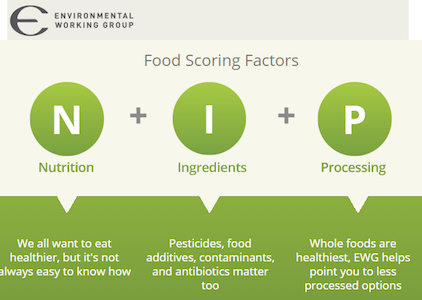
The New Tool that Scores Your Food
By Jamie Webber
Processed food. It’s everywhere. Office vending machines, corner markets, grocery stores, restaurants, ads in magazines — you can’t hide from it. At Reboot, and with most health conscious folks, we believe the less processed foods in your diet, the better. However, in most people’s reality, the convenience of it being so available means it’s hard to completely avoid it. Yes, fresh fruits and veggies win the race, but we’re only human and when processed foods are calling, whether it’s for a quick snack in between meetings or a fast and cheap dinner for your family, you might find yourself grabbing for a dinner that comes in a colorful cardboard or plastic package.
Our friends over at Environmental Working Group (the ones that provide us with the yearly updated Dirty Dozen List and Skin Deep score system that analyzes the toxicity and chemicals in our skin care) know that processed food happens, so they developed one of the most comprehensive online food databases, called Food Scores.
Why? Because in today’s typical grocery store visit, we can’t trust that every single “all natural” food label means it’s good for us, so we have to be more aware of what we are buying. In an EWG article, President and CEO Ken Cook says, “Today, shoppers who care about the quality of food and how it was produced might look for labels like ‘natural’ and ‘whole grain,’ ‘organic’ or ‘non-GMO certified,’ even as they wonder which claims mean something and which are marketing hype. The truly conscientious scrutinize the Nutrition Facts panel on the back of the package. But few if any of us have the time or patience to peruse an entire food section and compare one label with another, much less read the microscopic fine print that lists ingredients we often cannot pronounce.”
And that’s why they developed this scoring system, to provide a guide to “greener, cleaner and healthier food choices.”
How does it work?
EWG rated more than 80,000 products on 3 criteria:
- Nutrition — considering calories, saturated fat, trans fat, sugar, sodium, protein, fiber and fruit, vegetable and nut content.
- Ingredient concerns — focusing on factors such as the likely presence of key contaminants, pesticides, hormones and antibiotics, and the health implications of certain food additives.
- Processing — reflects EWG’s best estimate of the extent to which a particular food has been processed. Scoring factors include modification of individual ingredients from whole foods and the number of artificial ingredients.
They weigh a food’s nutritional value most heavily, ingredient concerns next and processing relatively lightly. It’s all free, and they even have an app for when you’re at the store and you don’t know which mac and cheese is better (you may be really surprised to find out that the organic ones aren’t necessarily better!).
Rate Your Food